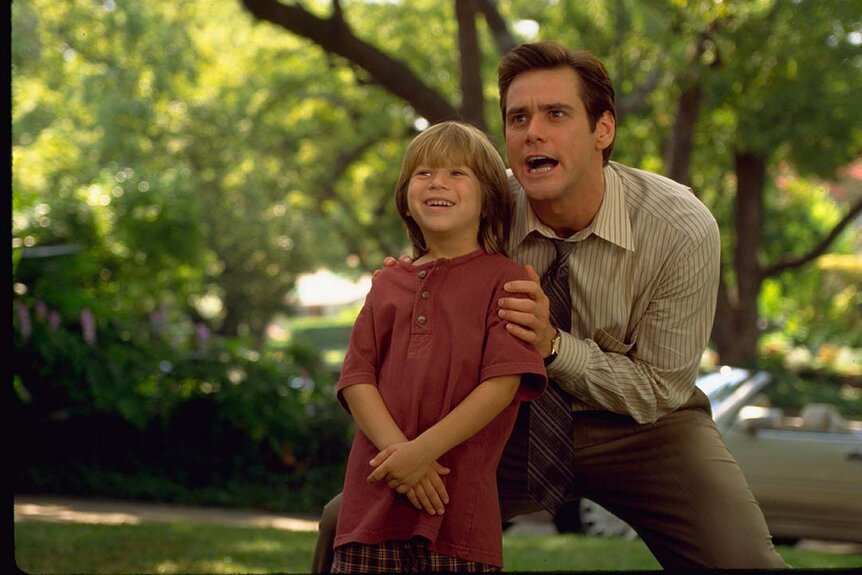Create a free profile to get unlimited access to exclusive videos, sweepstakes, and more!
Studios Hated Liar Liar So Much They Warned Screenwriters That Pitching It Was Hurting Their Career
Did you know this comedy gem was rejected all over Hollywood before Brian Grazer signed on to produce?

Why do we lie? Humanity's penchant for fudging the truth has always captivated screenwriter Paul Guay, who describes himself to SYFY WIRE as "one of these really naive people who can't believe that people will look at me with a straight face and just completely lie." This fascination led Guay to wonder what would happen if a person known for deception was forced to tell the truth for an entire day. He jotted this thought down on a napkin (see below) and eventually brought it to the attention of his writing partner, Stephen Mazur, in the early '90s.
"Originally, it was a story about a little kid who promised his grandmother he wouldn't lie and it caused all sorts of problems for the kid. But we decided that we didn't want to write kids’ movies exclusively, so we converted it to be about an adult," Mazur recalls, noting that 1994's The Little Rascals was the duo's only screenwriting credit up to that point.
As you can probably guess by now, the end result was Liar Liar (now streaming on Peacock). The movie tells the story of Fletcher Reede (Jim Carrey), a sleazy scumbag of an attorney with an uncanny knack for lying who, after disappointing his son for the umpteenth time, finds himself magically compelled to tell the truth on the eve of a career-defining case. In hindsight, it seems like a no-brainer for any major studio, but at the time, no one in Hollywood wanted to touch the thing with a 10-foot pole.
Liar Liar's inauspicious start
Following a number of early pitch meetings, Guay and Mazur got a dire call from their manager. "She says, 'This is a disaster. Not only do they not want to buy this movie, but it's hurting your careers by pitching this idea. They don't like this idea at all,'" Mazur reveals. "So we canceled the rest of the meetings."
Neither writer can firmly recall why the idea was so poorly-received, although Mazur speculates it might have had something to do with a recurring Saturday Night Live caricature known for telling obvious fibs (he's most likely thinking of Tommy Flanagan, played by Jon Lovitz between 1985 and 1997). "I think people thought that that might be the character we were talking about. I think they sort of focused on the popularity of that particular character and thought that was what we were talking about."
"I don't think our pitch was all that interesting initially," offers Guay, who now teaches screenwriting at the ArtCenter College of Design in Pasadena, California. "When we went to places in 1990, it probably wasn't the only pitch we were doing at a given company. So a company would say, ‘What else do you have?’ or whatever. We had thought it out to a certain extent, but we were probably doing an abbreviated version of the pitch ... I would like to be able to say that everybody in Hollywood is stupid, but I can't on the basis of this. We probably didn't give them enough for them to hear what they needed to hear."
Brian Grazer Comes to Liar Liar's Rescue
In any case, the writers placed Liar Liar on ice for several years until they happened to stop by the offices of Imagine Entertainment for a general sit-down with the appropriately named David Friendly (a key lieutenant of Imagine co-founders, Brian Grazer and Ron Howard). One of the subjects broached during this meeting was Mazur's time as a prosecutor for Los Angeles County, which prompted Friendly to mention that Grazer was "interested in doing something about a lawyer."
"And we said, ‘Well, we have an idea about a lawyer.’ So in about less than a minute, we pitched our idea for Liar Liar that had bombed so badly a couple of years earlier. He liked it and went, ‘Yeah, I’ll tell Brian about this,'" Mazur remembers. "So we go out and we need to get validated ... As we're waiting to validate our parking, we see David run into Brian in the hallway. We can't hear what they're saying, but we see Brian is really animated. He’s excited. David comes running out, grabs us and we go into Brian's office. Again, we probably gave him a two-minute version of the idea and he loved it."
"We were we were hired off a two-sentence pitch," adds Guay, who admits they initially toyed around with several occupations for Fletcher before settling on a lawyer. "We had done previous ideas in terms of, ‘Is this guy in real estate? Is he in politics? Is he a boxing promoter? Is he a lawyer?' Lawyer seemed to make sense for us because A) Steve was a lawyer and B) There's a lot of things that you can do with law that have an impact on other people's lives."
Jim Carrey: The biggest name in comedy
While writing the character of Fletcher, Guay and Mazur envisioned Tom Hanks or Steve Martin in the role. "Somebody who can do physical comedy and who is at home with tugging at the heartstrings [and] has some a certain amount of dramatic heft," Guay explains. Hugh Grant was seriously interested in boarding the project as the lead, but was forced to drop out in the wake of the Divine Brown scandal. The script ultimately caught the attention of Tom Shadyac and Jim Carrey, the duo behind 1994's Ace Ventura: Pet Detective.
"As I've heard the story, Jim Carrey was about to do The Truman Show and the script had not yet been finished [even though] he had been promised that it would be finished," Guay adds. "So Brian Grazer gets the script to him and because Jim is irritated that Truman Show isn't ready, he says ‘Yes' to our script ... That’s a pretty different actor than Hugh Grant and part of me thinks, ‘Wouldn't it have been fun to be able to compare the two versions?’ Where you've got the kind of more sly, sophisticated British, very classy guy — or guy who seems really classy, because he's British — versus the, ‘I need to outdo Jerry Lewis' that Jim Carrey brings to the table."
Once Carrey signed on, "things moved very fast because he was pay or play," Mazur says (Carrey made a cool $20 million on the deal). From there, it was just a matter of "restoring and reimagining it as a broader comedy" to better suit Carrey's unparalleled talent for physical hijinks, Guay says. On that front, Liar Liar could not have scored a better leading man. Carrey whole-heartedly sells the idea of a man who literally goes to war with himself when he can no longer rely on the dishonesty that's come to define his entire identity.
"He would he would ask for take after take," Guay continues. "He would start with the lines that we wrote, God bless him, and then he’d do improvs, and then improvs on improvs. Everything was 120 percent. I think they had like 41 cameras on him — I’m slightly exaggerating — because who knows what he's going to do and when he's going to do it? It's lightning in a bottle to have somebody like that, and you just want to capture them at the height of what it is that they're doing well. Talk about working for your 20 million, he threw himself body and soul into it."
Objection, Your Honor!
Guay and Mazur originally had Fletcher lying through his teeth in a murder case before switching the courtroom topic to divorce. In the movie, an ambitious Fletcher agrees to represent the unfaithful — and rather unpleasant — Samantha Cole (Jennifer Tilly), who, despite having very clearly cheated on her husband, sues for half the marital assets and custody of the couple's two children.
This legal tug-of-war serves as a nice reflection of the perjurious attorney at the heart of the story: the man's untruthful habits destroyed his marriage and nearly destroys his relationship with his impressionable son, Max (Justin Cooper), whose birthday wish forces Fletcher to be honest for a period of 24 hours.
"I know it's a comedy and it's goofy and it’s wild, but you still want it to have an emotional through-line," Mazur explains. "So to keep the struggle that Fletcher was going through alive when he was in court, we made it the perfect case, because it's a divorce case — a husband and wife with kids who are impacted by the divorce, which matches his life completely. So at any given moment, as he moves back and forth between these two worlds, that theme stayed alive."
"Most of us probably feel the pain of being lied to, and perhaps the guilt of lying. I think seeing something that identifiable, that every day, and then seeing the devastating consequences of it if it's carried to its logical conclusion, which is cheating on your wife, having her divorce you, not seeing your kid. Not because you don't love them, but because your priorities are so screwed up, that you don't make the time necessary and you don't have the empathy necessary to see the harm that you're causing this kid," echoes Guay. "It's kind of natural. It seems like a pretty funny, emotional idea."
As for why Max's birthday wish comes true, the answer is more of a non-answer: it doesn't matter. While the writers considered using other devices (like a turkey wishbone, for instance), they realized the mechanics of the fantastical element were less important than nailing home the emotional beats.
"The audiences don't really care how you get into it," Mazur declares. "As long as it's clear and understandable. The best example of that is Groundhog Day. In the original draft, there was, I think a Gypsy woman, who put a curse on Bill Murray's character. But as they were developing the project, they realized that wasn't necessary at all. People get what's going on, you don't need to lay it out."
"The logical question becomes, ‘How come everybody else's wishes aren't fulfilled?’ and I have no answer for that," Guay admits. "If my student had pitched this to me, I'd say, ‘It's really good, let's just hope people don't ask how come everybody else's wishes don't come true.' But I think the notion was that it was such a heartfelt wish by such an innocent kid, there was so much loss and longing in the wish, that the equivalent of a miracle occurs."
Lies are lucrative
Liar Liar opened in theaters on March 21, 1997 — just two weeks after the release of Howard Stern's Private Parts. "I was incredibly depressed because I figured he would clean our clock at the box office," Guay remembers. "So when we took the first weekend and had the biggest opening weekend in March, it's like, ‘This is a good sign.’"
Mazur asserts he knew the film was going to be big once Carrey signed on to play Fletcher. "He had had so many big successes in a row, that we just knew it was going to be fantastic. That he was going to be fantastic."
Three days later, Carrey appeared at the 69th Academy Awards to present the Oscar for Best Achievement in Visual Effects. "And how was your weekend?" he began, eliciting a great deal of laughter from the gathered crowd of Hollywood elites. This opening question was, of course, a cheeky reference the fact that the movie had opened to more than $31 million in domestic ticket sales.
"It was either The Hollywood Reporter or Variety that did a headline saying, 'This looks like it could be a $200 million picture.’ So we thought, ‘That's great!’" Guay adds. "And the declines each week were way less than you typically get for a big opening. So yeah, we wound up with the biggest March opening ever at that time, which was great. It was really flattering."
Liar Liar closed out its theatrical run with a global tally of $302.7 million against a production budget of $45 million. A staggering success like that usually means one thing in the minds of studio executives: S-E-Q-U-E-L. Suspecting this might be the case, Guay and Mazur did conceive of a second film, which they pitched to Grazer, who then passed along the message to Carrey's people. At the time, however, Carrey wasn't all that interested in making sequels (Ace Ventura: When Nature Calls being the obvious exception).
"I think I said this to [Brian] — I know I said it to our agents — ‘This picture was never conceived of for Jim Carrey. Is it possible you could do a sequel with a different actor?’" Guay says. "And they're looking at me like, ‘Oh, my God! You're the Antichrist! How dare you pitch that idea!’ So it was Jim Carrey or nothing and he wasn't doing sequels at that point."
Guay politely declines to give up any specific details about the unmade Liar Liar 2, stating that there's always a chance "it could be repurposed for something else in the future. Let me just say this: it's really funny and takes even more advantage of the physicality that Carrey showed in the first one."
Liar Liar's honest legacy
Maybe this lack of a sequel was for the best. Even after 27 years, the original film not only stands as a shining testament to the talents of Jim Carrey, but to a perfectly executed comedy. "Liar Liar is sometimes referenced as one of the ideal pitches for folks and they don't know the truth," Mazur says. "The truth is it totally bombed completely. You could not have crashed and burned worse than the Liar Liar pitch."
The movie enjoyed several shoutouts in the second season of the Chucky television series on SYFY and USA Network, which saw the character of Tiffany Valentine (played by Jennifer Tilly) endlessly poring over Jennifer Tilly's classic movies.
"I'm delighted, it's so flattering," says Guay when we mention the Chucky reference. "I think it's great that people remember it. When I was a kid, I was really naive and I thought, ‘I want to be immortal. I want to do something that lives forever.’ I'm now teaching students who are not familiar with a group called The Beatles. So I have an idea that I'm not going to be immortal, sadly. But the idea that a film can last longer than a month, longer than two months, and that 25 years later, there's enough of an audience to bring out a Blu-ray and that you and I are chatting about it... I mean, it's incredibly flattering."
Liar Liar is now streaming on Peacock.
Originally published Nov 23, 2022.






























